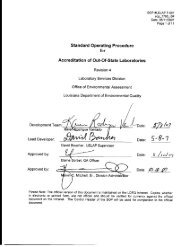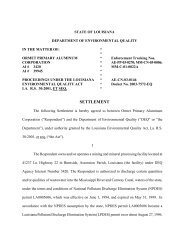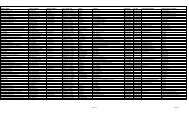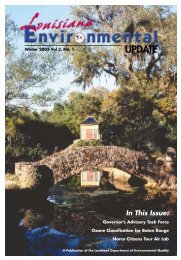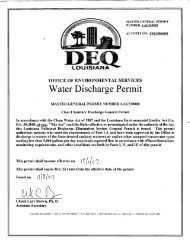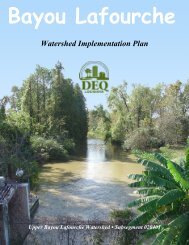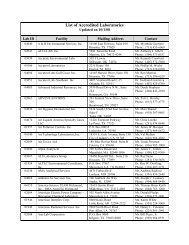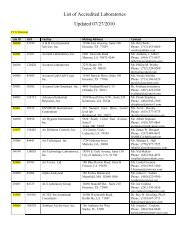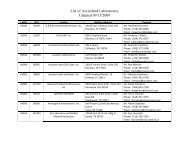UPDATE
UPDATE - Louisiana Department of Environmental Quality
UPDATE - Louisiana Department of Environmental Quality
- No tags were found...
You also want an ePaper? Increase the reach of your titles
YUMPU automatically turns print PDFs into web optimized ePapers that Google loves.
New Measures to<br />
Improve Air Quality<br />
Air quality affects every aspect of Louisiana life – health, economy and<br />
quality. While the air quality is better than it was 25 years ago when 20<br />
parishes did not meet the air quality standard for ozone, there is still<br />
much to do. On June 23, 2003, EPA reclassified East Baton Rouge, West Baton<br />
Rouge, Livingston, Ascension and Iberville Parishes as “severe” for the one-hour<br />
standard for ozone. The reclassification brought with it consequences spelled out<br />
in the Clean Air Act, including the use of reformulated gasoline.<br />
Last year presented an excellent opportunity for these parishes to meet the<br />
standard but non-predictable ozone spikes, which contained highly reactive<br />
hydrocarbons, caused the area to remain in nonattainment. Despite the progress,<br />
there is still much to do to meet this air quality standard thereby protecting<br />
Louisiana citizens. In a continuing effort to provide Louisiana with the best possible<br />
air quality, DEQ is taking serious steps to reach ozone attainment in the fiveparish<br />
nonattainment area.<br />
The first step was to form the Highly Reactive Volatile Organic Compounds<br />
(HRVOC) workgroup to study the causes of the ozone spikes. This group is comprised<br />
of industry leaders, environmentalists, DEQ personnel and interested parties.<br />
It split into three subgroups to study the problem. The subgroups studied<br />
exceedance/data analysis, emission/meteorology monitoring and emission inventory.<br />
The groups proposed strategies for addressing ozone exceedances. These<br />
recommendations included upgrading monitors before the 2004 ozone season,<br />
recording five minute data in addition to one hour, developing a data base for<br />
past and future data and performing statistical analysis on the data. DEQ has formulated<br />
a plan of action to attack the problem based on the recommendations<br />
of the HRVOC workgroup.<br />
1. Increase monitoring efforts.<br />
More frequent monitoring with wider parameters will allow DEQ to gather<br />
more detailed information on Baton Rouge-area emissions. The LSU, Carville and<br />
Capitol sites will be able to take samples continuously on a 24-hour basis. More<br />
than 300,000 measurements will be taken per year. The existing 10 monitoring<br />
stations in the five-parish area will have enhanced sampling capability and more<br />
monitors. DEQ will be able to take 160-170 air samples per week and additional<br />
lab equipment will allow the state to better analyze the data. With a more complete<br />
picture, DEQ can better define the problem and address it. New air-monitoring<br />
equipment will be up and running by mid-summer, the height of ozone<br />
season. For air quality information go to www.ldeq.org.<br />
2. Update database.<br />
Intensive review of historical, recent, and meteorological data and a revamped<br />
database will provide another important piece of the puzzle. DEQ will expand,<br />
enhance and consolidate its air-monitoring database. It will be a live database that<br />
will help DEQ effectively profile ozone precursors using new and historical data.<br />
The improved database will help DEQ in modeling, identifying problem areas,<br />
developing ozone reduction strategies and responding to ozone events and public<br />
inquiries. In the future, current information will be available to the public on<br />
the DEQ website, www.ldeq.org.<br />
3. Work closely with industry.<br />
DEQ has developed an industry action plan with an emphasis on fugitive<br />
emissions, point sources, cooling and wastewater and flares. The focus will be<br />
on pollutants that contribute to ozone. Highly reactive hydrocarbons, such as ethylene,<br />
toluene and propylene, will be closely studied. Fugitive, accidental and<br />
non-routine emissions will be more closely scrutinized. Mike McDaniel, DEQ<br />
Secretary, will meet with plant managers to discuss implementation of voluntary<br />
measures to discover and control emission sources. Facilities will be asked to<br />
develop action plans to reduce emissions, especially highly reactive, nitrogen<br />
oxides and volatile organic compounds<br />
DEQ’s surveillance team will have a renewed emphasis on and a different<br />
approach to inspections. The inspections will be longer and more detailed. They<br />
will concentrate on specific sources identified as having emission concerns.<br />
4. Educate the public.<br />
DEQ will continue and intensify its air quality campaign to educate the public<br />
about what they can do to help reduce ozone. Activities such as a gas can<br />
exchange, press conference, speaking engagements, presentations to community<br />
groups, written information and other initiatives will help raise public awareness.<br />
Partnering with other agencies, non-profit groups and local businesses will be a<br />
priority. The message will be that air quality in Louisiana is everyone’s responsibility<br />
and everyone can be part of the solution.<br />
Reaching the ozone standard and attainment is a priority at DEQ. Experts from<br />
industry, environmental groups, and DEQ staff have worked together to<br />
approach the problem with a comprehensive plan. These groups and the citizens<br />
of Louisiana will need to work together to promote ozone reduction and produce<br />
a healthier environment, better economy and good quality of life for all.<br />
Frequently Asked Questions<br />
about reformulated gas<br />
Q. What is reformulated gasoline<br />
(RFG)?<br />
A. Reformulated gasoline is a<br />
gasoline that contains an oxygen<br />
additive that is supposed to reduce<br />
ozone-forming pollutants. Currently,<br />
the most common oxygenates are<br />
ethanol and MTBE. In the Baton<br />
Rouge area, it is expected that<br />
ethanol will be the most common.<br />
Q. Where will RFG be sold and<br />
why?<br />
A. The federal government is<br />
requiring the sale of RFG at all gas<br />
stations in the 5-parish Baton Rouge<br />
area (Ascension, East Baton Rouge,<br />
Iberville, Livingston, West Baton<br />
Rouge) because the area has been<br />
reclassified to “severe” ozone<br />
nonattainment.<br />
Q. When will the changeover<br />
from conventional gasoline to RFG<br />
go into effect?<br />
A. June 23, 2004. Gas stations<br />
are expected to begin phasing in<br />
the supply before then.<br />
Q. Will the cost of gasoline at the<br />
pump increase because of RFG?<br />
A. The impact on gasoline pricing<br />
is uncertain. Varying sources have<br />
estimated an increase of anywhere<br />
between three and 15 cents per<br />
gallon.<br />
Q. Will there be a problem if I<br />
mix conventional gasoline and<br />
RFG?<br />
A. Based on available information,<br />
mixing RFG with conventional<br />
gasoline in a vehicle’s gas tank will<br />
not present any problems.<br />
Q. Will RFG affect the performance<br />
of my vehicle or damage the<br />
engine?<br />
A. According to the EPA, RFG will<br />
have no adverse effects on vehicle<br />
performance or the durability of<br />
engine and fuel system components.<br />
The use of RFG/ethanol in the<br />
Baton Rouge area is not expected<br />
to adversely impact vehicle performance.<br />
However, ethanol and<br />
water don’t mix well. If your tank<br />
has water in it or the gas station’s<br />
storage tank contains water, the fuel<br />
may influence the way your car<br />
drives.<br />
Q. Will RFG affect my vehicle gas<br />
mileage?<br />
A. According to EPA, gasoline<br />
containing an oxygenate such as<br />
ethanol reduces gas mileage by 1<br />
to 3 percent. Gas mileage can also<br />
be affected by the type of engine<br />
and vehicle, driving habits, weather<br />
conditions and vehicle maintenance.<br />
Q. Will RFG affect my vehicle<br />
warranties?<br />
A. Using RFG will not affect the<br />
manufacturer’s general warranty or<br />
the emissions warranty. If there’s<br />
ever a question concerning your<br />
warranty, see your owner’s manual<br />
or consult your local dealer.<br />
Q. Will RFG affect my marine<br />
engine?<br />
A. Marine engine manufacturers<br />
have indicated that the use of RFG<br />
in marine engines is acceptable,<br />
although some offer special instructions<br />
if you use RFG. You should<br />
always check your owner’s manual<br />
for any specific instructions or contact<br />
your local dealer. Once again,<br />
be aware that ethanol and water<br />
don’t mix well.<br />
Q. Will RFG affect my other types<br />
of engines such as lawn and garden<br />
equipment?<br />
A. According to EPA, various manufacturers<br />
of nonroad engines have<br />
indicated that using oxygenated<br />
fuels is acceptable, although some<br />
manufacturers offer special instructions<br />
when using reformulat gas.<br />
Consumers should follow the manufacturer’s<br />
recommendations found<br />
in their owner’s manuals or consult<br />
with a servicing dealer. Similar to<br />
automobiles, there are not expected<br />
to be any problems with the use of<br />
ethanol-based gasoline in other<br />
types of engines. However, prior to<br />
using ethanol-based gasoline in<br />
these types of motors, you should<br />
review the owner’s manual.<br />
For further information: The EPA<br />
does not have a hotline for reformulated<br />
gas questions. However, you<br />
can find information on RFG at<br />
http://www.epa.gov/region02/faq<br />
/#REFORMULATE. You can find<br />
information on how to contact a<br />
particular office at:<br />
http://www.epa.gov/epahome/co<br />
mments.htm<br />
The Louisiana Department of<br />
Environmental Quality is not<br />
implementing or enforcing this<br />
federal mandate.<br />
Page 5



